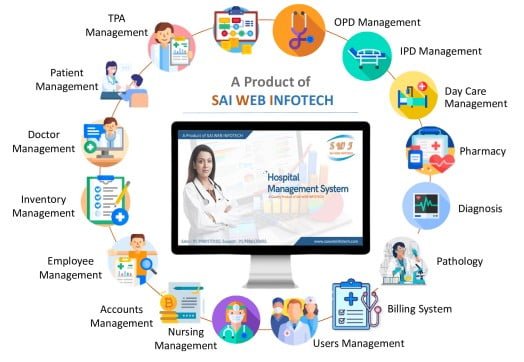
Discover everything you need to know about hospital software in our comprehensive guide. Explore features, benefits, implementation tips, and how to choose the best solution for your healthcare facility. Enhance patient care and streamline operations with the right hospital software.
Hospital Management software is an essential tool for modern healthcare facilities, designed to streamline operations, improve patient care, and enhance overall efficiency. Our comprehensive guide covers everything you need to know about hospital software:
What is Hospital Management Software?
Hospital software, also known as hospital management software or healthcare information system (HIS), refers to a suite of digital tools and applications designed to automate and streamline various aspects of hospital administration. These software solutions encompass a wide range of functionalities, including but not limited to:
- Patient Management: Hospital software allows for seamless patient registration, appointment scheduling, and electronic health record (EHR) management. With integrated databases, healthcare providers can access patient information quickly and securely, improving care coordination and reducing errors.
- Billing and Revenue Management: Automating billing processes is a significant advantage of hospital software. From generating invoices to managing insurance claims and tracking payments, these systems ensure accurate financial transactions and optimize revenue cycles.
- Clinical Decision Support: Hospital software often includes clinical decision support tools that assist healthcare professionals in making informed decisions. These tools may provide alerts for potential drug interactions, suggest evidence-based treatment protocols, and facilitate diagnostic decision-making.
- Inventory and Supply Chain Management: Efficient inventory management is crucial for hospitals to maintain adequate supplies of medications, medical devices, and other essentials. Hospital software helps track inventory levels, manage procurement processes, and minimize waste, leading to cost savings and improved resource allocation.
- Analytics and Reporting: Data analytics tools integrated into hospital software enable administrators to gain actionable insights into hospital operations. From tracking key performance indicators (KPIs) to identifying trends and forecasting demand, analytics empower informed decision-making and strategic planning.
Some of major Benefits of Hospital Management Software
- Enhanced Efficiency: By automating routine tasks and streamlining workflows, hospital software reduces administrative burden, allowing healthcare professionals to focus more on patient care.
- Improved Patient Care: Access to comprehensive patient records, clinical decision support tools, and real-time communication features enables personalized care delivery and better clinical outcomes.
- Cost Savings: From reducing paperwork and manual errors to optimizing resource utilization and billing processes, hospital software leads to cost savings and improved financial performance.
- Regulatory Compliance: Hospital software helps healthcare providers comply with regulatory requirements such as HIPAA (Health Insurance Portability and Accountability Act) by ensuring data privacy and security standards are met.
- Patient Engagement: Some hospital software solutions include patient portals and telehealth capabilities, fostering greater patient engagement and satisfaction through convenient access to healthcare services.
Key Considerations for Choosing Hospital Management Software
When selecting hospital software for your organization, consider the following factors:
- Scalability: Ensure the software can scale with your organization’s growth and evolving needs, accommodating changes in patient volume, services, and technology requirements.
- Interoperability: Look for interoperable solutions that can integrate with existing systems, such as electronic medical records (EMRs), laboratory information systems (LIS), and imaging systems, to facilitate seamless data exchange and continuity of care.
- Usability: Choose user-friendly software with intuitive interfaces and robust training and support options to ensure adoption and proficiency among staff members.
- Security: Prioritize software solutions with robust security features, including encryption, access controls, and audit trails, to protect sensitive patient data and comply with regulatory standards.
- Vendor Reputation: Research and evaluate vendors based on their industry experience, customer reviews, and track record of successful implementations to select a reliable and trusted partner for your hospital software needs.
Conclusion
Hospital software represents a transformative solution for modern healthcare organizations seeking to optimize operations, enhance patient care, and achieve sustainable growth. By leveraging the capabilities of advanced software technologies, hospitals can unlock new levels of efficiency, excellence, and innovation in delivering healthcare services.
Whether you’re a hospital administrator, healthcare professional, or IT decision-maker, embracing hospital software can propel your organization forward in the journey towards healthcare excellence. Explore the possibilities, harness the power of digital transformation, and empower your team to thrive in today’s dynamic healthcare landscape with comprehensive hospital software solutions.
GET IN TOUCH

